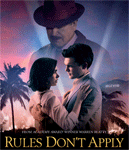Lily Collins Rules Don't Apply
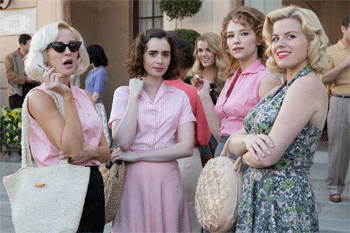
Lily Collins Rules Don't Apply
Cast: Lily Collins, Ed Harris, Haley Bennett, Alden Ehrenreich, Taissa Farmiga
Director: Warren Beatty
Genre: Comedy, Drama
Synopsis: An unconventional love story of an aspiring actress, her determined driver, and the eccentric billionaire who they work for.
Rules Don't Apply
Release Date: April 27th, 2017
The Rules Don't Apply
Music, Eddie Arkin/Lyrics, Lorraine Feather
One day I told my friend I was terribly blue.
Was it far too late to do what I dreamed I could do?
He thought for a moment, then he answered.
He said, 'The rules don't apply to you."
He said it very simply, and quietly too,
But as if there wasn't any doubt at all that he knew.
He gave me a gift that I would treasure.
He said, 'The rules don't apply to you."
In the movies we see, in the shows on TV,
And in anthems passionately sung,
There's a message that you've got to keep believing in yourself,
But they generally mean, if you're young.
Is it written in the air, as it seems to be,
That we haven't long at all to find our destiny?
I'll always remember to be grateful
That the rules don't apply to me.
I wouldn't lie.
The rules don't apply.
The rules don't apply to you
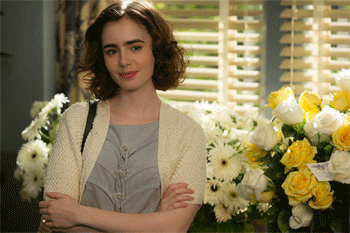 About The Production
About The Production
Set in 1950s Hollywood, Rules Don't Apply follows the burgeoning romance between aspiring actress Marla Mabrey (Lily Collins) and her ambitious driver Frank Forbes (Alden Ehrenreich). She is a small town beauty queen, songwriter, and devout Baptist. He is a Methodist engaged to his junior high school sweetheart. Both are employed by billionaire Howard Hughes (Warren Beatty) who has forbidden romance between his employees. As Frank and Marla fall in love and defy the rules, the sexual and cultural repression of the 50s makes way for the more liberated 1960s. The unconventional comedy offers a window into the often surreal realm of Howard Hughes, the billionaire movie mogul, famed aviator and legendary eccentric – who was both a rule-maker for many young stars and a rule-breaker - challenging the industry's social mores and restrictive moral code. Elements from the real Hughes' life are woven into a fictional comic tale that explores the changing landscape for women, the meaning of love and the transformative power of redemption and family.
The ensemble cast includes Alec Baldwin as real-life businessman Bob Maheu, Annette Bening as dignified Baptist mother Lucy Mabrey, Haley Bennett as actress Mamie, Candice Bergen as Hughes' secretary Nadine, Matthew Broderick as Hughes Company senior driver Levar Mathis, Dabney Coleman as Raymond Holiday, Steve Coogan as pilot Colonel Nigel Briggs, Taissa Farmiga as Frank's fiancée Sarah Bransford, Ed Harris as Mr. Bransford, Megan Hilty as actress Sally, Oliver Platt as businessman Forester and Martin Sheen as Hughes CEO Noah Dietrich.
The film's evocative ambiance of late 50s and early 60s ingénues, magnates, studios and lavish hotel rooms is provided by a decorated team that includes five-time Oscar®-nominated cinematographer Caleb Deschanel, four-time Oscar®-nominated production designer Jeannine Oppewall, two time Oscar®-winning costume designer Albert Wolsky, Oscar®-winning set decorator Nancy Haigh, Oscar®-winning makeup artist Valli O'Reilly, Emmy and BAFTA nominated hair stylist Cydney Cornell and acclaimed visual effects supervisor John Scheele.
Hollywood in 1958 was on the cusp of change. The major studios were beginning to see their all-encompassing power wane as independent, artist-driven companies rose. At the same time, the tightly contained Studio System – with its carefully cultivated idols under airtight contracts - would soon be declared over. And the popular films of the day would soon begin to mirror not the conservative values of the 50s but the churning sexual, political and social revolutions of the 60s.
1958 was also when a young Warren Beatty was just starting his career. Raised in Virginia within a Baptist family, he would arrive in Hollywood in 1958 and debut as a film star in 1961 opposite Natalie Wood in Elia Kazan's Splendor In The Grass - a story of sexual repression's consequences for two love-struck youngsters. The film presaged a coming era at the movies that would question every societal precept – of love, family, industry, religion, war, sexuality, politics, right down to what makes a -meaningful' life.
Warren Beatty would himself develop into one of America's premier Academy Award winning filmmakers. He has been nominated for 14 Academy Awards and won the Thalberg Award, among many others. 'In Warren Beatty's films, there is always a sense of melancholy mixed with a sense of humor, no matter what subject he writes about" his wife and two-time co-star Annette Bening observes. 'Whether he's making a film about Hollywood or politics or social mores."
Bonnie & Clyde (1967) used the exploits of the Depression-era outlaws to explore the creation of anti-hero rebels and is considered one of the first films of the -New Hollywood' era. Shampoo (1975) looked at the atmosphere of Nixon's 1968 election via the escapades of a Beverly Hills hairdresser and his wealthy clients. Heaven Can Wait (1978)– adapted the 1941 classic Here Comes Mr. Jordan into a comedy not only about love, football and celestial errors, but one set against the increasing corporatization of late 70s America.
 Reds (1981) followed real-life journalist John Reed into the Russian Revolution and romance but became equally a look at the rise of the American Left. Dick Tracy (1990) redefined the comic book genre in bringing the famed detective to life. Bugsy (1991), the story of the real-life gangster who created Las Vegas unraveled the inner contradictions of the Great American Con Man. The prescient Bulworth (1998) turned the 1996 political campaign into the tale of a plain-speaking U.S. Senator who becomes a pop sensation – in a satire touching on themes of globalization, race, media and the costs of our broken political system.
Reds (1981) followed real-life journalist John Reed into the Russian Revolution and romance but became equally a look at the rise of the American Left. Dick Tracy (1990) redefined the comic book genre in bringing the famed detective to life. Bugsy (1991), the story of the real-life gangster who created Las Vegas unraveled the inner contradictions of the Great American Con Man. The prescient Bulworth (1998) turned the 1996 political campaign into the tale of a plain-speaking U.S. Senator who becomes a pop sensation – in a satire touching on themes of globalization, race, media and the costs of our broken political system. After taking a break to raise a family, Warren Beatty returns with Rules Don't Apply, a film he had had in the back of his mind for many years, that reflects Beatty's own upbringing and arrival in Hollywood at a time of societal change.
Warren Beatty admits to a long-time amusement with Hughes: 'He could do whatever he wanted to do but there was a certain level of Puritanism that he never quite kicked," but devised a story that utilized Hughes' mystery and impact while avoiding a telling of the tycoon's life. 'I didn't write a biopic of Howard Hughes at all," says Warren Beatty. 'This is more a love story of two young people in 1958 who happen to be working for Hughes - a love story that explores the sometimes comical and sometimes sad consequences of American puritanism in the late 50s and early 60s when I first came to Hollywood."
That theme is personified by the film's romantic leads: Marla Mabrey, a Southern Baptist virgin pursuing Hollywood stardom despite her -square' religious upbringing; and Frank Forbes, a Fresno Methodist and a member of Hughes' vast stable of drivers who aims to follow in the tycoon's business footsteps. Both Marla and Frank vie to at least get a rarified chance to meet Hughes, who is hidden in a fog of rumors and speculation. Yet as both are figuring out how to navigate the rules of their upbringings while getting ahead in Hollywood, their growing attraction makes them fall foul of Hughes' most incontrovertible rule: that drivers and starlets must never, ever date.
Comments Warren Beatty: 'The story of Howard Hughes himself has an inevitable downward trajectory, I was more interested in telling the story of two people who, like myself, came to Hollywood in the time of Hughes, and fell in love when the rules were against them." The film also hones in on how the shifting power differential between men and women makes its mark on Marla and Frank - as their relationship progresses from 1958 to the postKennedy era of 1964. 'Over that brief period, the country saw a strong burst of feminism,"
observes Warren Beatty. 'Some refer to the late 50s and early 60s as the sexual revolution. I think it's fair to say there were real developments in the liberation of women, and that it resulted in a lot of turmoil, re-thinking, acceptance and denial. And it continues."
It is in this context that Marla breaks free of the expectations of the time. As director of photography Caleb Deschanel puts it: 'We watch over the course of the film as Marla and Frank triumph over the restrictions of the 50s – and become modern people."
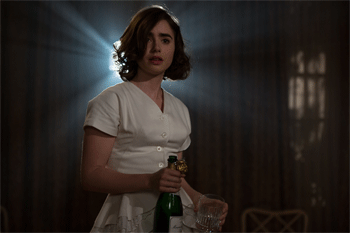 The film also reflects the shifts in Hollywood in a time of cultural change. Beatty himself witnessed the evolving of the former Studio System into a new, more creatively free Hollywood that led to groundbreaking films of the 70s. He recalls: 'From the first picture that I did, I felt I began to see the handwriting on the wall. That some actors were going to take on more responsibilities and control and I realised if I didn't take the responsibility for delivering a movie, that I would never really get to do what I, at times, wanted to do. Of course, there are times when you just want to act and play your character, but I've enjoyed doing both," he says.
The film also reflects the shifts in Hollywood in a time of cultural change. Beatty himself witnessed the evolving of the former Studio System into a new, more creatively free Hollywood that led to groundbreaking films of the 70s. He recalls: 'From the first picture that I did, I felt I began to see the handwriting on the wall. That some actors were going to take on more responsibilities and control and I realised if I didn't take the responsibility for delivering a movie, that I would never really get to do what I, at times, wanted to do. Of course, there are times when you just want to act and play your character, but I've enjoyed doing both," he says. The Actress
At the center of Rules Don't Apply are its two would-be, Howard Hughes-crossed lovers, who are up against Hughes' controlling ways, traditional notions of sin and guilt, as well as their own highly individualistic ambitions, even as they are inescapably drawn to one another. Beatty cast two relative newcomers to play the two Hollywood newcomers. 'I like to say that character is plot – and casting is character," says Warren Beatty. 'So ultimately casting becomes plot. When I met Lily and Alden, I thought oh, I see now how things happen in this story."
Lily Collins, who made her debut as Sandra Bullock's daughter in the Oscar®-nominated The Blind Side and became the lead in The Mortal Instruments and Snow White in Mirror Mirror, plays small-town beauty queen Marla Mabrey. In Rules Don't Apply, though at first innocent to Hollywood ways and under the watchful eye of her protective mother, Marla is smart, tough and grows increasingly savvy, as she chafes against conventions and ideals that don't seem to lead to satisfaction or happiness.
Says Warren Beatty of the casting: 'It took me I would say less than ten seconds to realise that Lily Collins was the person who would be, in my opinion, perfect for this story."
Says Lily Collins: 'I was about to go on vacation when I suddenly got a call saying, -Warren Beatty says you need to be back soon because you need to start rehearsing.' I was a bit terrified but also rather in awe of having this opportunity. It is a story so unlike anything else out there right now. '
The actress admits she was initially nervous when shooting began. 'Of course I was nervous because it's Warren Beatty! But I felt if he believes in me and there's something there that he sees, I better not let him down. I felt very much like Marla in that sense, not wanting to let Howard Hughes down," says Lily Collins, who immersed herself in research – reading books from the period, watching films and talking to those who had been there, including Warren Beatty, to explore how a small-town novice such as Marla would have found Hollywood at that time.
'I read books on the 50s and studied actresses who worked under Howard Hughes. But there was also a lot of just talking with Warren Beatty – who explains so well the feeling of that time – as well as with Caleb Deschanel, Albert Wolsky and Jeannine Oppewall. I got so much from hearing them speak about the environment for women then," she recalls. 'The more I understood the mindset of the times and the more that Warren Beatty told different stories, whether they were his personal stories or stories he'd come across in his career, I started to understand the moral shifts going on and the sexual repression."
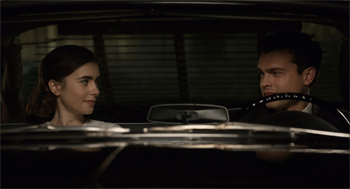 It was clear to Lily Collins why Marla starts to rebel against it all, especially when she comes away with far more than she ever expected from a hotel meeting with Hughes. 'It seemed to me that in the late 50s, women were expected to be very demure. They clearly had a certain kind of power, but at the same time, Hollywood was very much run by men," Lily Collins observes. 'You were given a voice, but you could only use it up to a point as a woman. I think Marla comes to challenge that limit to which women were allowed to use their voices. In Hollywood, Marla starts to realise she has an independence she maybe didn't even know she had."
It was clear to Lily Collins why Marla starts to rebel against it all, especially when she comes away with far more than she ever expected from a hotel meeting with Hughes. 'It seemed to me that in the late 50s, women were expected to be very demure. They clearly had a certain kind of power, but at the same time, Hollywood was very much run by men," Lily Collins observes. 'You were given a voice, but you could only use it up to a point as a woman. I think Marla comes to challenge that limit to which women were allowed to use their voices. In Hollywood, Marla starts to realise she has an independence she maybe didn't even know she had." Lily Collins sees Marla as ultimately choosing the one thing that seemed unlikely for a Hollywood starlet then: her own path. She continues: 'Marla starts out with the assumption that there is a very, very specific set of rules that young women must abide by to be successful. Yet through her journey in Los Angeles and all that she learns in her relationship with Frank, and also her relationship with Howard, she truly discovers that those rules don't have to apply to her. In fact, they don't have to apply to anyone."
For Lily Collins, the greatest drive within Marla is to be authentic, despite the pressure to recreate herself as a pure feminine fantasy. 'I've observed that there was a lot of filtering that women did in the 50s. The women who existed behind closed doors were not the women that you saw on screen," she notes. 'But Marla just wants to be Marla all the time. I think that's part of what makes her so alluring to me in her own way."
Even as Marla is encountering her sense of self and its power, she is torn by her competing desires. For one thing, she has to figure out what to do with her prohibited feelings for her driver, Frank. 'I think of Frank very much as Marla's forbidden fruit. They are definitely attracted but between their religions, the scruples of the time, the rules Howard Hughes has set and their own Hollywood dreams, it just seems it can never actually happen," Lily Collins muses. 'Yet they can't quite help themselves and because of that, it becomes this very fraught relationship."
Lily Collins' most delicate moments come as she sings Marla's composition, 'Rules Don't Apply." Warren Beatty brought in jazz songwriter Lorraine Feather (the god-daughter of Billie Holiday) and composer Eddie Arkin to create the film's centerpiece song. Says Collins: 'When Marla sings it for the first time to Frank, it's like a baring of her soul. It's her really exploring being a young woman who has feelings and is going to go after them, even if it's said by others to be immoral."
Still, it was a daunting proposition forLily Collins, who sang the song live on set. 'It was terrifying," she confesses of the scene. 'But there was something really freeing about it. There was something so pure about that. And I also felt that since, in the film, Lily Collins says she's a songwriter not a singer, she too would have had nerves in that moment. So if my voice cracked, it was fine, because that's exactly how Marla felt in that moment."
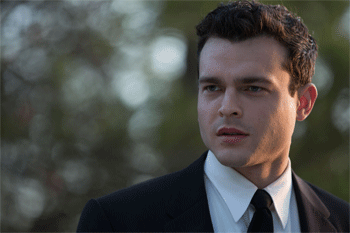 The performance matched Warren Beatty's aim. 'I love Lily Collins's voice when it is utterly unforced. She sings so honestly," Warren Beatty says.
The performance matched Warren Beatty's aim. 'I love Lily Collins's voice when it is utterly unforced. She sings so honestly," Warren Beatty says. Later, Lily Collins sings the same song to Hughes, to different impact. Explains Lily Collins: 'Marla has drunk alcohol for the first time and when she sings it to Howard, he feels the song coming from this genuine, loving place and he interprets it as: -I see you. I hear you. I feel your struggles. Sometimes we put these rules upon ourselves – and those rules don't have to apply to you, either.' It's a beautiful message that she shares with both men and ultimately in sharing it with them, I think she finally believes it within herself."
Equally challenging was Marla's drunkenness, as someone who has never had a sip of alcohol, downs a bottle of Hughes' champagne. 'Marla goes from devastation to comedy to drama in just a few minutes – there are so many emotions in that scene," she says. 'It was literally a rollercoaster ride. I felt like I had overcome a war when we finished that scene. It was scary but extremely satisfying.
'I hadn't quite realised how effective it can be for an actor to relinquish self-control. It's those moments when you stop doing what you planned that you get to something spontaneous, something even you weren't expecting. I'm always going to take that lesson with me."
The Driver
Ask Lily Collins for her thoughts on her co-star Alden Ehrenreich and the response is unequivocal: 'Alden is a complete movie star," Lily Collins declares. 'When he walks in a room, you want to pay attention. When he speaks, you want to know what he's saying. He's grounded and fun but with an intellect, and I think that's why Marla is attracted to Frank, also."
Alden Ehrenreich has appeared in Woody Allen's Blue Jasmine, Park Chan-Wook's Stoker and the Coen Brothers' Hail Caesar, and is set to star in the coveted role of the young Han Solo in Star Wars Episode IV. As with Collins, Warren Beatty had an inkling early on about Alden Ehrenreich – having first met him years ago, just as Alden Ehrenreich was starting his career – and stayed in touch. Alden Ehrenreich calls it 'a five-year audition."
Explains Alden Ehrenreich: 'I met Warren Beatty when I was 19 and had just done my first film. We developed this friendship, or sort of apprenticeship, where we'd hang out and talk about all the movies Warren Beatty's made and I'd get all kinds of stories. He has an interesting perspective, not only on the film industry right now but also on the history of cinema and it was a great learning experience."
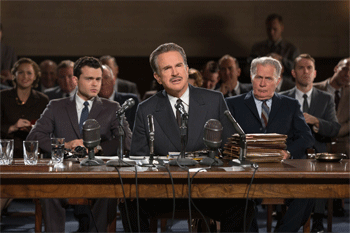 Working with Warren Beatty offered Alden Ehrenreich an insight into his methods. 'Warren approaches filmmaking in quite an unconventional way," observes Alden Ehrenreich. 'Every person involved in the film begins their work by coming to his house and getting to know him – which sets the stage. That's something I think he took from Elia Kazan who would also hang out with his actors for a long time. I think part of what he's doing is getting to know what is deep inside people and how to work with them on that level – and that also influences how he envisions the movie."
Working with Warren Beatty offered Alden Ehrenreich an insight into his methods. 'Warren approaches filmmaking in quite an unconventional way," observes Alden Ehrenreich. 'Every person involved in the film begins their work by coming to his house and getting to know him – which sets the stage. That's something I think he took from Elia Kazan who would also hang out with his actors for a long time. I think part of what he's doing is getting to know what is deep inside people and how to work with them on that level – and that also influences how he envisions the movie." For Alden Ehrenreich, part of the appeal of Rules Don't Apply is that it's about a search that has now become a defining part of modern life over the last half century: the search for how we each can break out of the limitations we think are imposed upon us: 'I think the film is about a lot of things," says the actor. 'But at its heart it's about choosing your priorities in life – about whether you're going to let yourself be controlled by one kind of system or another or if instead, you're going to take the chance to create your own life free from society's pressures and guilts."
Alden Ehrenreich felt an instant connection to Frank, who begins the film as a Hughes driver but has barely concealed business ambitions – ambitions that are boosted when he gets a chance to join Hughes' inner circle. 'Frank is someone who is very ambitious, very driven to succeed," says Alden Ehrenreich. 'When we first meet him, he's never even seen Hughes but once they do meet, they slowly develop a very interesting kind of kinship. Howard eventually learns to trust Frank, even though he doesn't trust easily, to say the least, which puts Frank in an unusually privileged position."
It's also in his capacity as a driver for Hughes that Frank meets Marla, who is unlike most of his starlet passengers. 'They're both kind of lost in this new world and they strike up a bond that feels like it should be romantic," Alden Ehrenreich observes. 'But they're also thrust into this crazy situation that Howard Hughes creates, where it seems the things they want in their careers are destined to keep them apart."
As Frank and Marla hit barriers in their relationship, the realities of Hollywood as a business - and a fantasy - start to become clearer to both. Says Alden Ehrenreich: 'The heat of their feelings, which are being held at bay, drives them to act erratically and starts to wreak havoc on their lives. At the same time, these are two people who have been intoxicated by the dream of Hollywood - and I think they start to realize the dream they're going after is partially a mirage. That's a big awakening for them."
Like Lily Collins, Alden Ehrenreich turned to Warren Beatty for some of his research. 'I picked his brain not only about films he's been part of, but also the transition between the old Hollywood of the 50s and the new Hollywood of the 60s and 70s. He was so young when he started but he knew people like Orson Welles and Charlie Chaplin, so getting first-person insight like that was invaluable. It was like being in film school," he muses.
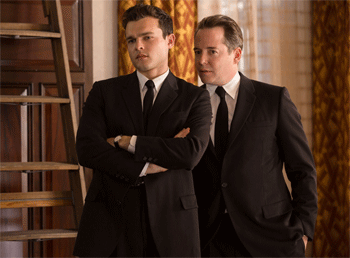 All along, Alden Ehrenreich was anticipating working one-on-one with Warren Beatty as Hughes starts to grudgingly acknowledge Frank, then takes him under his wing – and vice versa. 'There's a lot of very personal emotional content to Frank's relationship with Howard," Alden Ehrenreich notes. 'Warren always talked about Frank and Howard as a kind of father-son relationship, but in the sense that Frank starts to become for Howard his father."
All along, Alden Ehrenreich was anticipating working one-on-one with Warren Beatty as Hughes starts to grudgingly acknowledge Frank, then takes him under his wing – and vice versa. 'There's a lot of very personal emotional content to Frank's relationship with Howard," Alden Ehrenreich notes. 'Warren always talked about Frank and Howard as a kind of father-son relationship, but in the sense that Frank starts to become for Howard his father." Warren Beatty was gratified by Alden Ehrenreich's performance. 'Alden Ehrenreich is smart. He's got a great sense of humor. He's good looking. But he has also has genuine humility. As does Lily Collins. They both have genuine humility, and that is a very important character element in this film," he says.
Equally important, the chemistry between Alden Ehrenreich and Lily Collins was readily apparent. 'They're good on their own, but they make each other better," concludes Warren Beatty.
The Billionaire
Having become a symbol of decline in more recent times, it would be easy to forget how powerful and popular Howard Hughes was at one time. Long before he became the quintessential celebrity eccentric in the latter half of his life, Hughes was enormously influential on the culture – as a paradigmatic chaser of the American Dream.
After inheriting a fortune and the family tool business from his father, who died when he was just 18, Hughes became enchanted by all manner of industries involving big dreams. First, he cemented his reputation in Hollywood with the hits Hell's Angels and Scarface. Then, even as he was producing and directing movies, he founded Hughes Aircraft Company, while also setting aviation records as a risk-taking pilot. Already a global icon and the most famed American flyer since Charles Lindbergh, Hughes then took over TWA, ushering America into the Jet Age. But by the late 1940s, the man celebrated for his daredevilry and industrial shrewdness, and envied for his glamorous Hollywood affairs, was shadowed by rumors of obsessive compulsions, reclusiveness, the hiring of body doubles and numerous other intriguing idiosyncrasies.
While writing the character, Warren Beatty combined fact, apocryphal stories and imagination presenting a Hughes who is as lonely and misunderstood as he is wealthy and powerful. Warren Beatty's Hughes is a legend wrestling with his own smothering myth, a tangle of contradictions: at once brilliant and more than a little eccentric. Both seducer and loner, buoyed by power but in search of something more while also battling mental illness.
As cinematographer Caleb Deschanel notes: 'Warren Beatty's Howard is someone who is both fascinatingly strange and at the same time really human and slightly tragic."
Warren Beatty never had a personal encounter with Hughes, but Hughes' presence was strongly felt in Hollywood when Warren Beatty arrived. He met many people who had worked with Hughes, which gave him a different perspective. 'I knew many people who knew Howard very well – and really everyone spoke very highly of him," he notes. 'By that point, I don't know that Howard was terribly interested in making more money. He was interested in flying, in filmmaking, in politics and in other things."
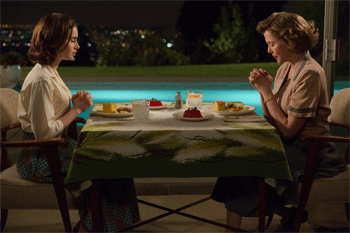 Still there was a sense that Hughes' unusual life lent itself to a kind of constant dissonance between his image and his reality. 'I think sometimes if you have all the financial resources and power to do whatever you want to do in life, that can be trouble," Beatty observes.
Still there was a sense that Hughes' unusual life lent itself to a kind of constant dissonance between his image and his reality. 'I think sometimes if you have all the financial resources and power to do whatever you want to do in life, that can be trouble," Beatty observes. Warren Beatty also points out that Hughes' cryptic public image was partly of his own making. The late 50s was a time when privacy was more attainable even for the very famous – and it was also more cultivated, something the film plays upon.
'Hughes created a kind of mystery around himself," suggests Warren Beatty, 'that I don't think you could create now with all the social media. The interesting thing is that in the 30s, 40s and even the 50s privacy was actually possible for the very famous. And sometimes privacy was maybe overly glamorized as well. Hollywood actors were taught very much then to control how they were seen in every aspect. I don't know that it's possible any more, unless one wants to become a complete recluse."
Says Annette Bening of Warren Beatty's take on Hughes: 'I think it's very funny and sort of outrageous – but then there is this core of pain and softness within Hughes that he also gets across. It's both hilarious and very, very touching."
Warren Beatty approaches the act of directing as emerging from a close alliance with the actors, which includes himself when he's acting in his own films.
'Directing is always a collaborative experience," Warren Beatty concludes. 'I've been lucky enough to work with what I would call great actors in many of my films and what is interesting is that I always feel that they're sort of directing me a little bit, too, in a scene.
It's always a give-and-take. So when you are directing yourself, it is somewhat the same thing in that you are relying on your fellow actors. If you know them well enough, you will know how you are doing just from the way they are responding to you."
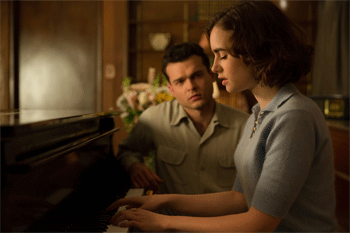 The Ensemble
The Ensemble Around Lily Collins and Alden Ehrenreich is an accomplished cast, each of whom creates a distinctive persona, many loosely based on historical figures or composites. They range from award-winning household names including Alec Baldwin, Annette Bening, Candice Bergen, Matthew Broderick, Steve Coogan, Ed Harris, Oliver Platt and Martin Sheen to up-andcomers including Haley Bennett and Taissa Farmiga.
Says Warren Beatty: 'Alec Baldwin is priceless as Bob Maheu, whom I knew. There's no actor more fun to work with than Matthew Broderick. He has such a great sense of what's funny and he's a pleasure to be around. The same applies to Oliver Platt, who was also hilarious in Bulworth, and there's not a funnier person going than Steve Coogan."
He continues: 'Marty Sheen is a rare gift to any movie that he's in - as is Candy Bergen, who I've known since she was 17 and who has a great comedic sense, as well as being a fantastic dramatic actress. Taissa Farmiga is wonderful, and I think she has a big future – and Ed Harris was kind enough to come in and work with his wife Amy Madigan as Taissa's parents. Haley Bennett and Megan Hilty are also very impressive. Dabney Coleman personifies that which is most meaningful from Hughes' childhood. Paul Sorvino is always perfect."
One cast member had an up-close look at the development of the story – Beatty's wife, the four-time Oscar® nominee Annette Bening (also seen this year in 20th Century Women), who portrays Lucy Mabrey. She says: 'I've known about this story for a long time, as it continued to evolve."
Annette Bening notes this is the first time she has been directed by Warren Beatty. 'I've made movies with him but I've never been directed by him. I'd been told by other actors that being directed by him was a great experience, but had never been there first-hand. I found that his enthusiasm is infectious and he is incredibly attentive. He really respects actors, and he really wants to hear what they have to say. He's just a great audience, so I felt very free and it was a delight. Also, he got to boss me around, which I think he kind of enjoyed!"
For Annette Bening, Lucy Mabrey was also a fun challenge, different from any other character she has played. 'I think Lucy Mabrey's a pretty intelligent woman," she observes. 'She's also a very religious person and somewhat suspicious of the circumstances under which her daughter has been brought to Hollywood by Howard Hughes. She feels protective and not at all sure it's a good idea. She's a loving mother who of course wants happiness for her daughter but she finds the whole situation a bit strange. Yet, I think she ends up surprising people in her reactions to what happens to Marla. Lucy's not entirely who she seems."
 Two-time Tony Award winner and Golden Globe nominee Matthew Broderick portrays one of Hughes' myriad right-hand men: the head of his pool of drivers, Levar Mathis, who guides Frank on his odyssey into Hughes' mysterious world. Broderick says the draw was both Beatty and a story that felt like nothing else out there.
Two-time Tony Award winner and Golden Globe nominee Matthew Broderick portrays one of Hughes' myriad right-hand men: the head of his pool of drivers, Levar Mathis, who guides Frank on his odyssey into Hughes' mysterious world. Broderick says the draw was both Beatty and a story that felt like nothing else out there. He notes: 'There's a retro quality to the movie because it feels so personal. It feels like a Warren Beatty movie, not a movie made by committee. You can see in his filmmaking that he cares about every hair on every head and it's really and completely his movie. Those aren't so common anymore."
The Design
Rules Don't Apply re-creates a world that existed not all that long ago, yet has nearly disappeared visually: the Hollywood of the late 1950s. To create the film's vivid style, Warren Beatty convened a team of acknowledged masters in their fields: director of photography Caleb Deschanel, production designer Jeannine Oppewall and costume designer Albert Wolsky. 'Albert did Bugsy for us and won the Academy Award®. For me, he's faultless – and he's also one of the few people that I know who is anywhere near my age," Beatty quips.
'He's done a terrific job on Rules Don't Apply. Jeannine Oppewall is an equally great production designer. She is fun to work with, no nonsense, and will say exactly what she feels. Caleb is a master cinematographer and brought us wonderful images."
Deschanel, a winner of the American Society of Cinematographers Lifetime Achievement Award, is a five-time Oscar® nominee for The Right Stuff, The Natural, Fly Away Home, The Patriot and The Passion of the Christ, as well as an award-winner for such films as Being There and The Black Stallion. Known for being able to illuminate the mythic as well as the intimate with his compositions and lighting, he brings both qualities to Rules Don't Apply.
Observes Matthew Broderick: 'Caleb really gives this film the look of a classic Technicolor movie from that Golden Age of Hollywood, but it also looks modern. Somehow, he marries the two seamlessly. And he use lighting in ways I just haven't seen in a long time – where it really captures the feeling in people's eyes. His visuals are so beautiful to look at, as well as just original and unexpected."
Adds Annette Bening: 'There's such a glamorous ambiance to the whole movie. It's sort of a step up from reality, and more the way movies used to look."
Deschanel says he watched 50s and 60s television for inspiration, rather than movies. 'Television gives you such a wonderful reference for how really life was at that time," he explains. 'And what's wonderful about Rules Don't Apply is that it is about two characters who start out as very much part of that era but by the end of the film, they've become modern characters."
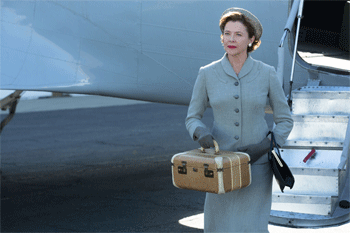 A big focus for Deschanel in creating the look of the film was lighting and shadow. 'One important element is that Howard Hughes is always in the dark. Often cinematographers have to fight directors who always want to make things brighter but Warren was the opposite," he recalls, 'because he really wanted this specific, dark and mysterious environment for Howard. So, when Lily first meets Howard in his hotel suite, at first you can barely make him out. I wanted it to be that kind of moment where you want to see more of him and you're anxious to have that chance so when he does finally come into the light in the film, it's fascinating to finally see him clearly."
A big focus for Deschanel in creating the look of the film was lighting and shadow. 'One important element is that Howard Hughes is always in the dark. Often cinematographers have to fight directors who always want to make things brighter but Warren was the opposite," he recalls, 'because he really wanted this specific, dark and mysterious environment for Howard. So, when Lily first meets Howard in his hotel suite, at first you can barely make him out. I wanted it to be that kind of moment where you want to see more of him and you're anxious to have that chance so when he does finally come into the light in the film, it's fascinating to finally see him clearly." One of Deschanel's favorite scenes is the film's climax. 'I love the final scene in the bedroom with the curtains, when Lily comes to see Howard after several years. There are a lot of puzzle pieces that link up in that moment and it all comes together in a wonderful way, yet with Howard maintaining his mystery right to the end."
As the father of two leading female actors and filmmakers [Zooey and Emily], Deschanel also loved that the film is partly about the rise of women in Hollywood, and in the world. 'Having seen where things were in the 60s, I think things are so much better now," he observes. 'That doesn't mean there isn't still a lot of room for improvement and more progress. But I like that this film takes place in a period of time when it was sort of the nascence of the ideal that we might one day have full equality."
Jeannine Oppewall, an Oscar® nominee for L.A. Confidential, Pleasantville, Seabiscuit and The Good Shepherd, is no stranger to period films – nor to historical Los Angeles. But for Rules Don't Apply she creates the more secretive and exclusive Hollywood of Howard Hughes, a largely behind-the-scenes realm of hotel rooms, screening rooms, rented houses, restaurants and the back seats of cars.
'This film brings back an L.A. that's really hard to find today," Jeannine Oppewall points out.
'There are parts of that Old Hollywood that are still out there but the challenge in this film was piecing it all together with what we needed to create for these characters. I think one of the lovely things about this film is that Warren Beatty does things in such an old-fashioned Hollywood way where he really takes his time to think about every frame and I think people are a bit starved for that kind of filmmaking. Warren also has a way of telling big stories with a light hand."
Another challenge was that Howard Hughes was, as Jeannine Oppewall says, 'a man who lived mainly in dark hotel suites at this juncture." She and her team became virtual hoteliers, recreating posh resorts including the Beverly Hills Hotel, the Desert Inn of Las Vegas, The Acapulco Princess, London's Ritz and Managua's Intercontinental. 'They couldn't all be the same, so each hotel has its own style," Jeannine Oppewall notes. 'The Desert Inn is Midcentury Modern, Managua is in the style of Grand Dame South American hotels, while London is coolertoned European luxury."
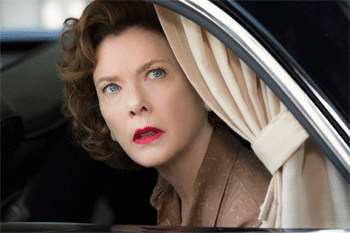 The Beverly Hills Hotel allowed the film the rare privilege of shooting exteriors. Then, Jeannine Oppewall built the interior of the suites from scratch on a stage. For both the Acapulco Princess and the Desert Inn, she utilized the former Arrowhead Springs Hotel & Spa in San Bernardino, designed by celebrated Southern California architect Paul Williams. In a twist, the building is now the headquarters for Campus Crusade for Christ. However, the group welcomed the production, and Jeannine Oppewall was able to create two diverse designs, tearing down one 'hotel" and crafting another in an entirely opposite decorative style.
The Beverly Hills Hotel allowed the film the rare privilege of shooting exteriors. Then, Jeannine Oppewall built the interior of the suites from scratch on a stage. For both the Acapulco Princess and the Desert Inn, she utilized the former Arrowhead Springs Hotel & Spa in San Bernardino, designed by celebrated Southern California architect Paul Williams. In a twist, the building is now the headquarters for Campus Crusade for Christ. However, the group welcomed the production, and Jeannine Oppewall was able to create two diverse designs, tearing down one 'hotel" and crafting another in an entirely opposite decorative style. 'That place is a real jewel," says Jeannine Oppewall of the Williams complex in the Southern California mountains. 'The original interiors had been done by Dorothy Draper, who was also known for her luxury hotel designs. And it even once had an Elizabeth Taylor Wedding Suite. One of the things you realize looking at this former hotel is how much our sense of space has changed. You look at these movie star suites and think, that's not much bigger than a typical middle class bedroom now! Also people had far fewer possessions so houses and rooms weren't as cluttered."
That is certainly the case for the rented house to which Marla and her mother arrive in the Hollywood Hills. 'Originally Warren Beatty and I talked about using a typical Spanish Mediterranean but then we started looking at newer Mid Century houses of the era, because Hughes was known for his interest in architecture," says Oppewall. 'The house we found was crazy because it's on such a steep hill and it was just an insane task getting equipment in and out of there, but then … it has that amazing view."
Oppewall also utilized the real Musso & Frank Grill, a restaurant that's been on Hollywood Boulevard since 1919; and the Hollywood Studio Club YWCA, designed by legendarily prolific California architect Julia Morgan, who also designed Hearst Castle. A fun aspect for Oppewall was working in an arena new to her: aeronautics. Her team recreated both a 50s-era control tower – based on a dilapidated relic at the Ontario airport that Oppewall explored with a rickety ladder -- and the cockpit of the now exceedingly rare, propeller-driven Lockheed Constellation, the design of which Hughes had commissioned when he was heading TWA. (Scrapped after the coming of jets in the 60s and 70s, there are few working Constellation survivors.)
'I'm no aviation expert so it was kind of a steep learning curve," she muses. 'We realized early on we weren't going to find a usable Constellation. So we got to work with research and photos and a consultant who knew the Constellation inside and out. The aim was to get all the gizmos in the cockpit visually right – while also working for the funny way that scene goes!"
Throughout, Oppewall took great pleasure in collaborating with Beatty. 'Because Warren is the writer, he'd already spent years imagining how these characters would move within the sets – that was very important to him and different from other directors I've worked with," she says. 'Warren reads ground plans to scale very, very well, so we were able to talk in great detail about the layout. It was an interesting dance with him every day.
With Warren, you learn how to tease and parry - and I found it a lovely way to work."
Many of the cast were similarly enthusiastic about working with costume designer Albert Wolsky, who is known for clothing that evinces character in every stitch. An Oscar® winner for All That Jazz and Bugsy, he has been nominated for his work on Sophie's Choice, The Journey of Natty Gann, Toys, Across The Universe and Revolutionary Road. He recently designed costumes for Alejandro G. Inarritu's Best Picture winner Birdman.
'Albert Wolsky is such a gem," smiles Lily Collins. 'He's so particular and delicate and precise to the millimeter. He taught me so much about proportion and how the slightest change can alter your entire body shape and give a whole new impression."
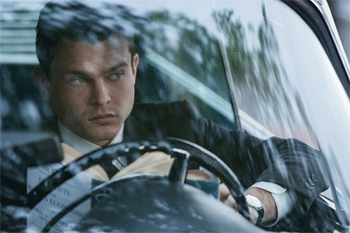 She adds: 'Warren was very particular about Marla's look and how he wanted to see her evolving as a young woman really would. And Albert – with his colors and his patterns and even his hats and purses – created Marla's shifts so beautifully."
She adds: 'Warren was very particular about Marla's look and how he wanted to see her evolving as a young woman really would. And Albert – with his colors and his patterns and even his hats and purses – created Marla's shifts so beautifully." Adds Broderick: 'Albert Wolsky is simply one of the greats. He's so smart and funny and everyone looks gorgeous in his clothing. I think my character was frustrating for him because he just wears a uniform. But even with that, he put such great care into those suits and shirts, getting the fit and every detail just right."
The sets, costumes and photographic style became another major source of inspiration for the actors. 'The Hollywood that Jeannine, Albert and the crew created was somehow both intimate and totally transporting," sums up Alden Ehrenreich. 'You could see that it was so moving for Warren to be on the sets because it looked a lot like the world that he must have found when he came from Virginia to California in 1959. It was an incredibly rich environment that made this imaginative love story feel so real."
Rules Don't Apply
Release Date: April 27th, 2017
Have You Seen This?
MORE
- Mission: Impossible Fallout
- Glenn Close The Wife
- Allison Chhorn Stanley's Mouth Interview
- Benicio Del Toro Sicario: Day of the Soldado
- Dame Judi Dench Tea With The Dames
- Sandra Bullock Ocean's 8
- Chris Pratt Jurassic World: Fallen Kingdom
- Claudia Sangiorgi Dalimore and Michelle Grace...
- Rachel McAdams Disobedience Interview
- Sebastián Lelio and Alessandro Nivola...
- Perri Cummings Trench Interview

